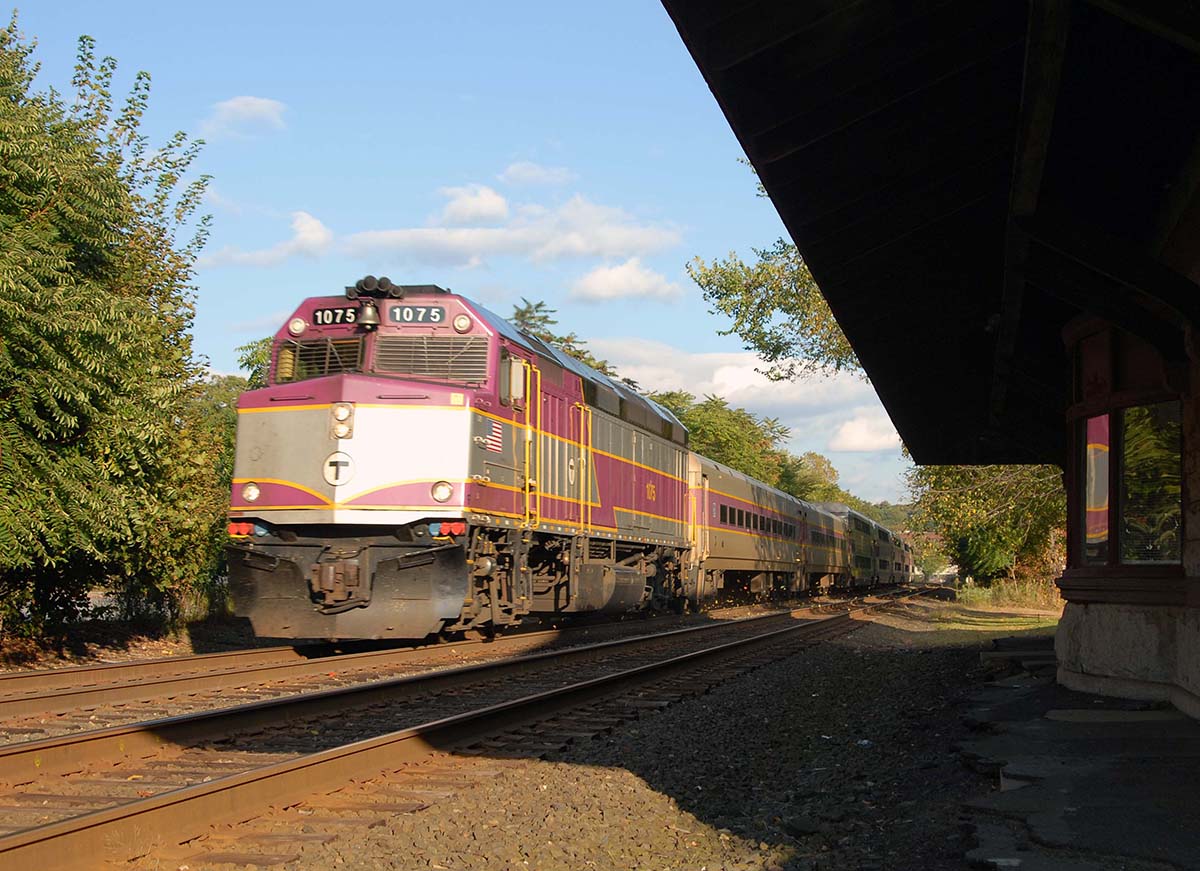New Commuter Rail Trains Fail, but On-Time Performance Still Goes Up
The new locomotives powering Commuter Rail trains have experienced their share of hiccups since joining the MBTA fleet in 2014. A new analysis from the Boston Globe found the new locomotives suffered from dead batteries, software glitches, faulty speedometers, and even brake problems. According to the MBTA, the problems experienced by the locomotives are covered by warranty and will not cost the agency anything out of pocket.
All these problems must have led to some decline in on-time performance on the Commuter Rail, right? No, actually.
Even while the Commuter Rail was experiencing these problems, its on-time rate went up, and by December 2015, the train had its highest on-time rate of the year, when 95.5 percent of cars trains ran on-time when adjusting for outside factors.
The increase in the Commuter Rail’s on-time performance is likely rooted in the replacement of older, more faulty locomotives by the newer ones experiencing occasional problems.
By the end of December 2015, the new HSP46 locomotives from Pennsylvania-based Motive Power were failing at a much lower rate than the rest of the Commuter Rail’s aging fleet. The industry standard for measuring failure rates for public transportation equipment is a metric called mean miles between failure or, MMBF. The December 2015 MMBF for HSP46 locomotives was 18,273 miles, while the rest of the locomotives in the fleet fared struggled with MMBF rates between 450 and 6,215 miles.
The new locomotives were highly touted by the MBTA in 2014 as cleaner and more fuel efficient than the current rolling stock. The engines in the locomotives were designed by soon-to-be Boston-based General Electric. When the HSP46 locomotives joined the fleet, they replaced locomotives more than 40 years old.
The problems with the new engines do, however, recall similar headaches the MBTA has experienced after receiving new equipment:
- In 2014, the MBTA received new Commuter Rail coaches plagued with problems from Hyundai Rotem, a South Korean company that delivered on its contract with the MBTA over 2 1/2 years late. Former MBTA General Manager Beverly Scott downplayed the problems at the time as “the stuff [that] wouldn’t be noticeable to anybody but us.” The problems ranged from faulty internal heating and cooling systems to software glitches that prevented the cars from communicating on rail lines owned by Amtrak. In some instances, the brakes and undercarriages on cars were poorly assembled when they were delivered to the MBTA. Even the doors on the new coaches were plagued by problems.
- In 2008, the MBTA started running new Blue Line cars for the first time since 1980, but the cars were delivered more than three years late from Siemens Transportation Systems because of manufacturing difficulties and schedule changes. The prototype cars were beset by air conditioning problems and faulty sealant in the windows and doors before they were even delivered to the MBTA. Siemens chalked up the late delivery of the Blue Line cars to problems with suppliers and subcontractors. When the cars were finally put in service, the only real problems they faced revolved around the public address system.
- In 1995, the MBTA signed a deal for new Green Line cars with an Italian company now known as AnsaldoBreda that would later be described by some as their worst ever contract. When the cars began pilot runs in 1999 and 2000, they were removed from service because they derailed so frequently on the Green Line. A 2004 report from the state auditor’s office found the MBTA failed to properly manage the design phase of the new Green Line cars, costing the agency approximately $101 million over the 20 year lifespan of the cars. Additionally, the MBTA failed to provide AnsaldoBreda with the appropriate information about the Green Line tracks to avoid derailments. The MBTA ultimately completed the order of new Green Line cars after halting order of them in 2004.
In 2013, the MBTA announced it would replace the entire Orange and Red Line fleets by 2019 with cars assembled at a new Chinese-owned manufacturing facility in Springfield, Massachusetts. So far, there have not been any problems with the new subway car procurement.



